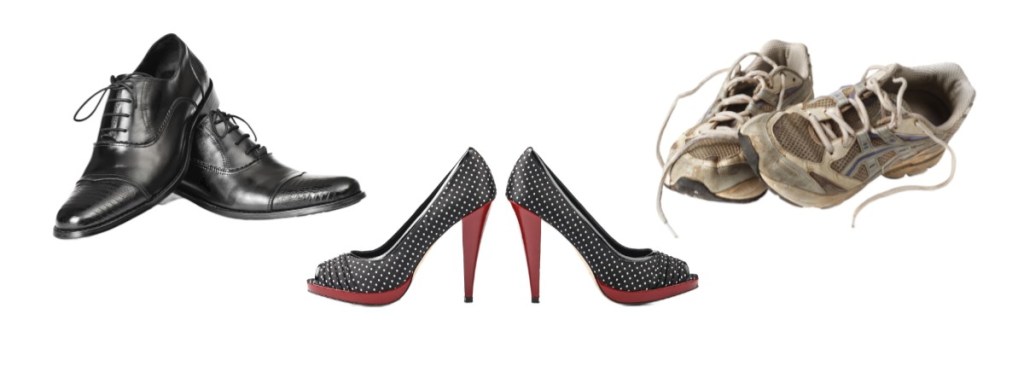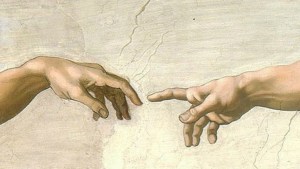One of the many laugh-out-loud moments in The Code of the Woosters is when Bertie Wooster opines to his butler, “There are moments, Jeeves, when one asks oneself, ‘Do trousers matter?'” Jeeves responds, “The mood will pass, sir.”
I’ve always loved watching the Jeeves and Wooster television series starring Hugh Laurie and Stephen Fry. First of all because they’re hilarious, but secondly because I like to see how everyone is dressed. Tweed suits, bow-ties, and hats create an air of gentility and culture around Wooster as he bumbles his way through life. It’s great to see that dressing well doesn’t equate to stuffiness and arrogance but, rather, it’s part of a whimsical cultural inheritance.
Of course, one glance at the other shoppers in the supermarket these days makes it abundantly clear that our current societal trend is not towards dressing well. Jeeves would be exceedingly disappointed in us. Gone are the days of men wearing suits and hats for a casual afternoon around town. Gone are the days of well-made dresses and fancy hats for women. Nowadays, I see a lot of frumpy sweatshirts, baggy shorts, and even people wearing pajamas in public places. The author Tom Wolfe, who was well known for dressing well, lamented over these sorts of people who “squeeze casual until it screamed for mercy.”
The right to be casual
Wolfe really puts his finger on the issue when he uses the word “casual.” There’s an obsession in modernity with our individual right to be casual. The argument is that, if I’m comfortable, that’s all that matters. Other people have no business telling me what to wear. The formality of dressing nicely is artificial and unnecessary, so let’s all dress the way we want.
Before we surrender to such an opinion, I think there are a few considerations to bear in mind.
The connection of body and soul
The first is the connection of the soul to the body. It’s a mistake to disconnect the two, assuming that the real person is only the invisible soul buried somewhere in all that unnecessary flesh. It would equally be a mistake to assume that a human being has no soul at all, and we are merely physical creatures. The truth is that our bodies and souls are inextricably linked. This means that the way we dress our bodies matters because our souls matter. The exterior reflects the interior.
We are icons of Christ inside and out. St. Gregory Narek makes this connection when he asks God to, “Cleanse the temple of my body/ The vessel of my soul.” When we dress well, we do so because we are adorning the harmonious, proportional beauty of the human figure in a way that brings dignity to our humanity, and we are also adorning the bodily temple that tabernacles the soul.
In The Spirit of the Liturgy, Pope Benedict XVI says something fascinating about clothing when he notes that St. Paul, “does not want to discard his body, he does not want to be bodiless…He does not want flight but transformation. He hopes for resurrection. Thus, the theology of clothing becomes a theology of the body. The body is more than an external dressing up of man — it is part of his very being, of his essential constitution.” That’s a strong statement, to connect our belief in the bodily resurrection to the way we dress those same bodies. I think it’s a statement worth pondering.

Who am I dressing for?
The second consideration to keep in mind is to ask ourselves who it is we’re dressing nicely for. Is it for me alone? G.K. Chesterton has a perceptive insight in Orthodoxy, writing, “The modern man thought [St. Thomas] Becket’s robes too rich and his meals too poor. But then the modern man was really exceptional in history; no man before ever ate such elaborate dinners in such ugly clothes … The man who disliked vestments wore a pair of preposterous trousers.” After his death as a martyr, a secret was uncovered about Thomas Becket while his body was being prepared for burial — underneath all his fancy clothing, he wore a hair shirt.
Becket’s hair shirt was a form of penance, invisible to everyone else, that itched and caused him constant irritation. Chesterton says, “Becket got the benefit of the hair shirt while the people in the street got the benefit of the crimson and gold.” In other words, the nice clothing was out of respect for God and other people. Becket dressed nicely not for himself but for others. The clothing was a reflection of the glory of God. I think that’s still a good principle for us today.
We dress nicely to show respect for those around us and for our Creator. Clothing isn’t about our own individual comfort.
A return to dressing nicely
I will say that, even as there are ongoing public controversies about how to dress at certain institutions, the advisability of dress codes, and the ever-present debate on modesty, I do notice a voluntary return among mass-goers in my parish to dressing as nicely as they can. In doing so, they aren’t showing off or displaying rigid formality – they’re trying to show God how much they love him. They are signaling through their clothing that this is an important event.
There’s a wide variety of clothing that fits under the category of Sunday best. It may range from a nice pair of jeans with your best cowboy boots all the way to a seersucker suit with bowtie. Certain minimalists or religious types who practice asceticism may possess very little nice clothing at all, and that’s okay, but remember that even St. Francis of Assisi wore beautiful vestments when he was deacon at the Mass.
The point isn’t who has the most expensive suit or most flashy dress, and it certainly isn’t to judge each other based on exterior appearances. The point is that we all, in our own way, are called to give our very best.
We adorn the body to reveal its beauty, to acknowledge that we are, indeed, made in the image of Christ. We are his finest creations.



